To understand America’s race issue, look at its fast-food chains
Waffle House is in hot water—again.


Waffle House is in hot water—again.
The US restaurant chain, which spans 25 states, has been rocked by four racial incidents in the past 12 days alone. Some of these were recorded. In one video, a police officer is seen choking and slamming a young black man who was at a Waffle House after taking his 16 year-old-sister to her high school prom. In another, three white police officers throw a black woman onto the floor (paywall) of a Waffle House, threaten to break her arm, and expose her breasts.
The spate of violent encounters is prompting calls for boycotts of the chain. Beatrice A. King, daughter of Martin Luther King, tweeted that people should stay out of Waffle House until the corporate office takes racial discrimination more seriously.
Because fast-food restaurants are frequent public gathering spaces that draw a wide cross-section of Americans, what happens inside them is often indicative of America’s attitude toward its citizens (paywall)—particularly of black Americans. Waffle House has been a staple across the American South for more than 60 years, and it’s long been dogged by allegations of racial discrimination. In fact, over the last 40 years, Waffle House has been sued at least 10 times on those grounds.
The suits are as follows:
- In 1984, a former white female employee sued a Waffle House in Georgia. She alleged that she had been discharged from her job because she was married to a black man.
- In 2001, members of a gospel group filed a federal civil-rights lawsuit against Waffle House. They said that workers at the company in North Carolina made them leave their seats so white patrons could sit.
- In 2002, an interracial married couple sued Waffle House after visiting a restaurant in Columbus, North Carolina. The couple claimed that the staff would not serve them.
- In 2004, an African-American family in Georgia sued Waffle House. They said that staff had refused to serve them and chose to serve the white customers around them instead.
- In 2005, an African-American family sued Waffle House (this time in South Carolina) after a waitress allegedly told them that the restaurant didn’t serve black people.
- Also in 2005, another African-American family sued Waffle House in Georgia, claiming they were denied service because of their race. The family originated from Augusta, Georgia.
- In 2006, a group of African-Americans came together and sued Waffle House for “a pattern and practice on Waffle House’s part of discriminating against African-Americans in the provision of food and services.” The suit included examples of African-American customers not being served and being asked to pre-pay for their food (while white customers weren’t).
- In 2013, a white employee sued Waffle house for racial discrimination. She claimed that two African-American employees “made discriminatory remarks about her race and age” and were not disciplined.
- In 2014, an African-American employee sued Waffle House, claiming he was subjected to an unequal treatment while he worked there.
- In 2016, an African-American couple sued Waffle House, claiming that a white waitress refused to serve them. Another waiter had served them instead. Later, a group of motorcyclists, including the white waitress’ father, entered the restaurant and sat at a booth next to the couple. When the couple left the restaurant, they alleged that the motorcyclists followed them outside. The waitress’s father allegedly showed a knife to intimidate and threaten them, while the waitress insulted them.
The recent arrest of two black men for simply sitting in a Starbucks store shows that Waffle House is hardly alone in being subject to accusations of racial discrimination. The company has long denied those allegations. But if the recent boycott picks up momentum, the company may be forced to confront its past.